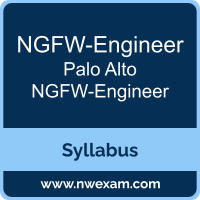 A great way to start the Palo Alto Networks Certified Next-Generation Firewall Engineer (NGFW-Engineer) preparation is to begin by properly appreciating the role that syllabus and study guide play in the Palo Alto NGFW-Engineer certification exam. This study guide is an instrument to get you on the same page with Palo Alto and understand the nature of the Palo Alto NGFW-Engineer exam.
A great way to start the Palo Alto Networks Certified Next-Generation Firewall Engineer (NGFW-Engineer) preparation is to begin by properly appreciating the role that syllabus and study guide play in the Palo Alto NGFW-Engineer certification exam. This study guide is an instrument to get you on the same page with Palo Alto and understand the nature of the Palo Alto NGFW-Engineer exam.
Our team of experts has composed this Palo Alto NGFW-Engineer exam preparation guide to provide the overview about Palo Alto Next-Generation Firewall exam, study material, sample questions, practice exam and ways to interpret the exam objectives to help you assess your readiness for the Palo Alto NGFW-Engineer exam by identifying prerequisite areas of knowledge. We recommend you to refer the simulation questions and practice test listed in this guide to determine what type of questions will be asked and the level of difficulty that could be tested in the Palo Alto NGFW-Engineer certification exam.
Palo Alto NGFW-Engineer Exam Overview:
|
Exam Name
|
Palo Alto Next-Generation Firewall Engineer Engineer |
| Exam Number | NGFW-Engineer |
| Exam Price | $250 USD |
| Duration | 90 minutes |
| Number of Questions | 75 |
| Passing Score | 860 on a scale of 300 to 1000 |
| Recommended Training |
(EDU-210) Firewall Essentials: Configuration and Management Panorama: NGFW Management |
| Exam Registration | PEARSON VUE |
| Sample Questions | Palo Alto NGFW-Engineer Sample Questions |
| Practice Exam | Palo Alto Networks Certified Next-Generation Firewall Engineer Practice Test |
Palo Alto NGFW-Engineer Exam Topics:
| Section | Weight | Objectives |
|---|---|---|
| PAN-OS Networking Configuration | 38% |
- Configure interface
- Configure zones
- Configure routing
- Configure GlobalProtect
- Configure tunnels
|
| PAN-OS Device Setting Configuration | 40% |
- Implement authentication roles, profiles, and sequences - Configure virtual systems (VSYS)
- Configure loggin
- Implement PAN-OS software updates
- Configure on-premises and Cloud Identity Engine User-ID
- Configure web proxy on PAN-OS |
| Integration and Automation | 22% |
- Install the selected deployment option
- Use APIs to automate deployment
- Build Application Command Center (ACC) dashboards and custom reports |
Palo Alto NGFW-Engineer Exam Description:
The Palo Alto Networks Certified Next-Generation Firewall (NGFW) Engineer certification validates the knowledge and skill of experienced NGFW engineers and administrators in the areas of configuration of PAN-OS networking and device settings, integration and automation, creation of object configurations, creation of policies, and management and operation of next-generation firewalls in network security environments.
